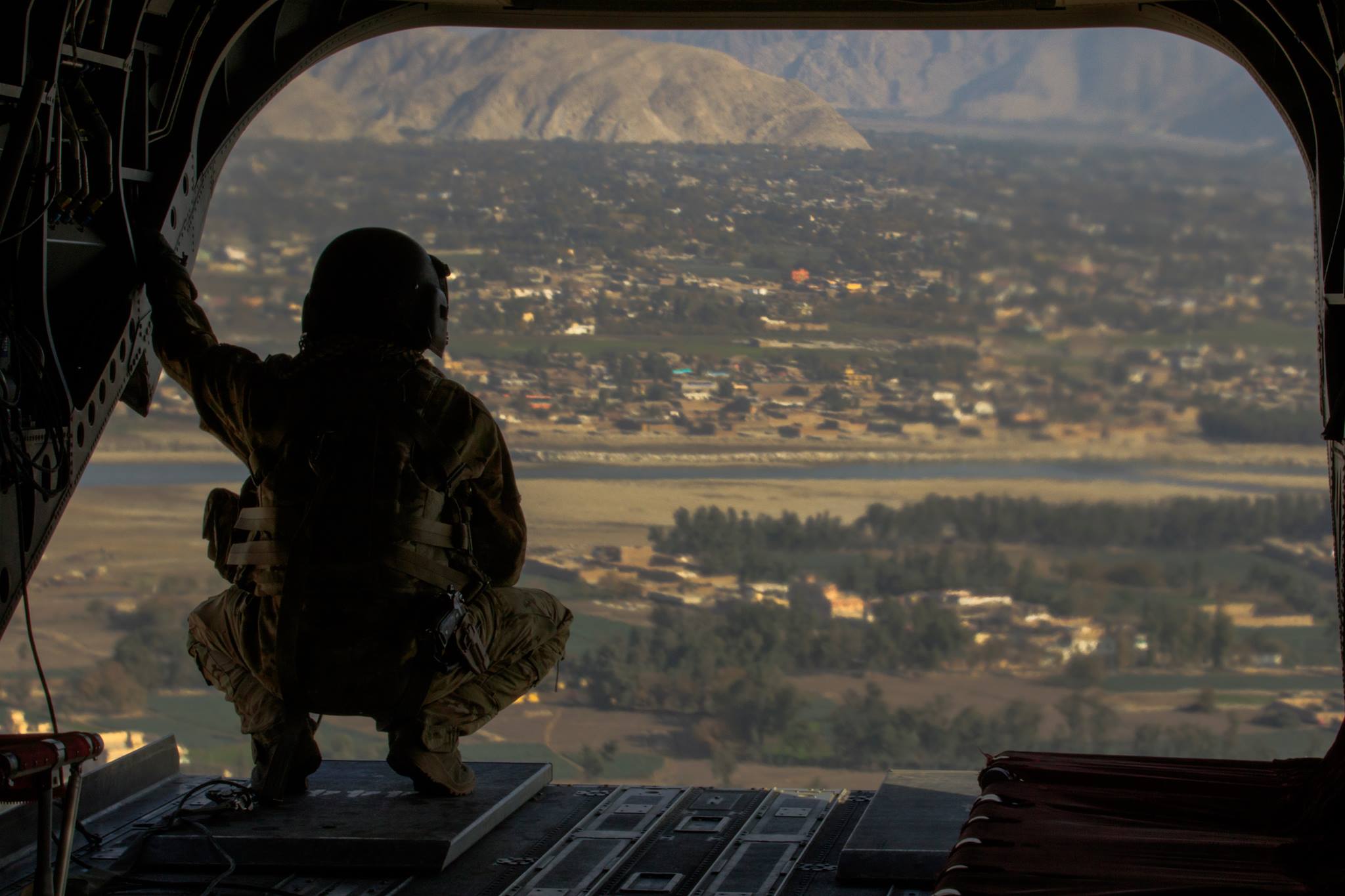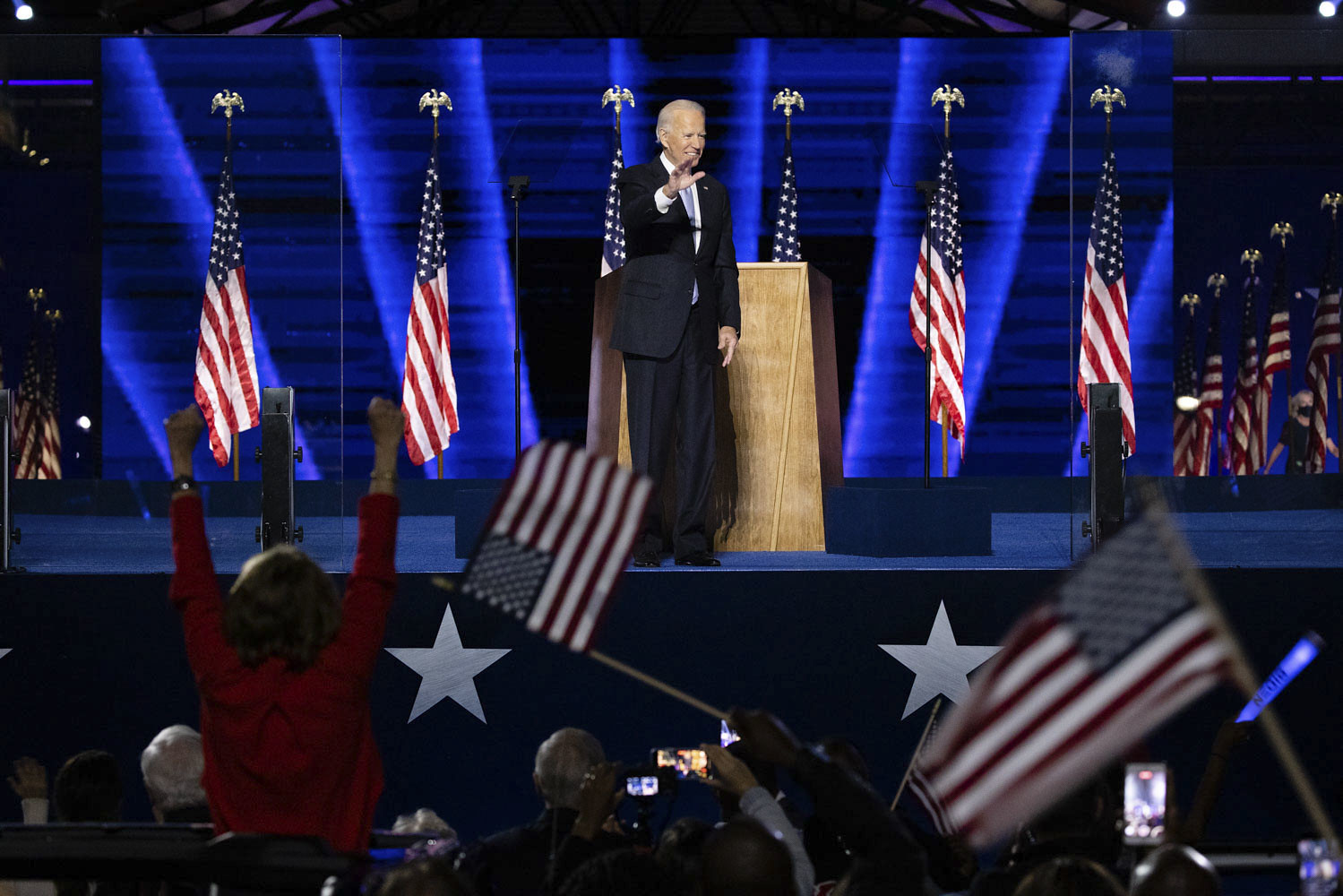Nick Turse. But the president-elect enters the White House with an opportunity to make good on his pledge to end them.

U.S. Army soldier surveys area over Jalalabad, Afghanistan, January 2018. (U.S. Army, CC BY 2.0, Wikimedia Commons)
 “This is a different kind of war, which we will wage aggressively and methodically to disrupt and destroy terrorist activity,” President George W. Bush announced a little more than two weeks after the 9/11 attacks. “Some victories will be won outside of public view, in tragedies avoided and threats eliminated. Other victories will be clear to all.”
“This is a different kind of war, which we will wage aggressively and methodically to disrupt and destroy terrorist activity,” President George W. Bush announced a little more than two weeks after the 9/11 attacks. “Some victories will be won outside of public view, in tragedies avoided and threats eliminated. Other victories will be clear to all.”
This year will mark the 20th anniversary of the war on terror, including America’s undeclared conflict in Afghanistan. After that war’s original moniker, Operation Infinite Justice, was nixed for offending Muslim sensibilities, the Pentagon rebranded it Operation Enduring Freedom. Despite neither a clear victory, nor the slightest evidence that enduring freedom had ever been imposed on that country, “U.S. combat operations in Afghanistan ended,” according to the Defense Department, in 2014. In reality, that combat simply continued under a new name, Operation Freedom’s Sentinel, and grinds on to this very day.
Like the 2003 invasion of Iraq, known as Operation Iraqi Freedom, Enduring Freedom and Freedom’s Sentinel failed to live up to their names. Nor did any of the monikers slapped on America’s post-9/11 wars ever catch the public imagination; the battlefields spread from Afghanistan and Iraq to Yemen, Somalia, the Philippines, Libya, Syria, Niger, Burkina Faso, and beyond — at a price tag north of $6.4 trillion and a human toll that includes at least 335,000 civilians killed and at least 37 million displaced from their homes. Meanwhile, those long promised clear victories never materialized even as the number of terrorist groups around the world proliferated.
Last month, America’s top general offered an assessment of the Afghan War that was as apt as it was bleak. “We believe that after two decades of consistent effort, we’ve achieved a modicum of success,” said Chairman of the Joint Chiefs of Staff General Mark Milley. “I would also argue over the last five to seven years at a minimum, we have been in a condition of strategic stalemate.”
Milley’s soundbites provided appellations far more apt than those the Pentagon dreamt up over the years. Had the Defense Department opened the post-9/11 wars with names like Operation Modicum of Success or Operation Strategic Stalemate, Americans would at least have had a realistic idea of what to expect in the ensuing decades as three presidents waged undeclared wars without achieving victories anywhere across the Greater Middle East or Africa.

Army Gen. Mark A. Milley, chairman of the Joint Chiefs of Staff, at Army-Navy football game at U.S. Military Academy at West Point, New York, Dec. 12, 2020. (DOD, Carlos M. Vazquez II)
What the future will bring in terms of this country’s many armed conflicts is murkier than ever as the Trump administration pursues an array of 11th-hour efforts interpreted as last-minute attempts to make good on pledges to end this country’s “endless wars” or simply as sour-grapes shots at upending, undermining, and sabotaging the “deep state” (the CIA in particular), while handcuffing or kneecapping the incoming Biden administration’s future foreign policy.
As it happens, however, President Donald Trump’s flailing final gambits, while by no means ending America’s wars, provide the Biden administration with a unique opportunity to put those conflicts in the history books, should the president-elect choose to take advantage of the inadvertent gift his predecessor provided.
Third President Not to End War on Terror
For four years, the Trump administration has waged a multifront war, not only in Afghanistan, Iraq, Somalia, Syria, and elsewhere around the globe, but with the Pentagon as well. Donald Trump entered the White House vowing to stop America’s ceaseless foreign interventions and repeatedly teased ending those “endless wars.” He didn’t. Instead, he and his administration continued to wage America’s many conflicts, surged troops into Afghanistan and Syria, and threatened nuclear strikes against enemies and allies alike.
Please Contribute to Consortium
News‘ Winter Fund Drive
When the president finally began making halting gestures toward curtailing the country’s endless conflicts and attempted to draw down troops in various war zones, the Pentagon and State Department slow walked, slow rolled, and stymied their commander-in-chief, deceiving him, for example, when it came to something as basic as the actual number of U.S. troops in Syria.
Even after striking a 2020 deal with the Taliban to settle the Afghan War and ordering significant troop withdrawals from that country and others as he became a lame-duck president, he failed to halt a single armed intervention that he had inherited.
Far from ending endless wars, Trump escalated the most endless of them: the conflicts in Afghanistan and Somalia where America has been intermittently involved since the 1970s and 1990s, respectively. Air strikes in Somalia have, for instance, skyrocketed under the Trump administration.
From 2007 to 2017, the U.S. military conducted 42 declared air attacks in that country. Under Trump, 37 strikes were conducted in 2017, 48 in 2018, and 63 in 2019. Last year, U.S. Africa Command (AFRICOM) acknowledged 53 air strikes in Somalia, more than during the 16 years of the administrations of George W. Bush and Barack Obama.

Aerial view of coast south of Mogadishu, Somalia. (AMISOM, Flickr, CC0, Wikimedia Commons)
The reasons for that increase remain shrouded in secrecy. In March 2017, however, Trump reportedly designated parts of Somalia as “areas of active hostilities,” while removing Obama-era rules requiring that there be near certainty that airstrikes will not injure or kill noncombatants.
Although the White House refuses to explicitly confirm or deny that this ever happened, retired Brigadier General Donald Bolduc, who headed Special Operations Command Africa at the time, told The Intercept that the “burden of proof as to who could be targeted and for what reason changed dramatically.” That change, he noted, led AFRICOM to conduct strikes that previously would not have been carried out.
The uptick in airstrikes has been disastrous for civilians. While Africa Command recently acknowledged five deaths of noncombatants in Somalia from all such airstrikes, an investigation by Amnesty International found that, in just nine of them, 21 civilians were killed and 11 others injured.
According to the U.K.-based monitoring group Airwars, evidence suggests that as many as 13 Somali civilians have been killed by U.S. strikes in 2020 alone, and Trump’s recent decision to withdraw U.S. forces from there will not end those air attacks, much less America’s war, according to the Pentagon. “While a change in force posture, this action is not a change in U.S. policy,” reads a Defense Department statement that followed Trump’s withdrawal order. “The U.S. will retain the capability to conduct targeted counterterrorism operations in Somalia and collect early warnings and indicators regarding threats to the homeland.”

U.S. Army sniper prepares to provide security for an airlift in Somalia, June 16, 2020. (U.S. Air Force, Shawn White)
The war in Afghanistan has followed a similar trajectory under Trump. Far from deescalating the conflict as it negotiated a peace deal with the Taliban and pursued troop drawdowns, the administration ramped up the war on multiple fronts, initially deploying more troops and increasing its use of U.S. air power. As in Somalia, civilians suffered mightily, according to a recent report by Neta Crawford of Brown University’s Costs of War project.
During its first year in office, the Trump administration relaxed the rules of engagement and escalated the air war in an effort to gain leverage at the bargaining table. “From 2017 through 2019, civilian deaths due to U.S. and allied forces’ air strikes in Afghanistan dramatically increased,” wrote Crawford. “In 2019, airstrikes killed 700 civilians — more civilians than in any other year since the beginning of the war in 2001 and 2002.”
After the U.S. and the Taliban reached a tentative peace agreement last February, U.S. air strikes declined, but never completely ceased. As recently as last month, the U.S. reportedly conducted one in Afghanistan that resulted in civilian casualties.
As those civilian deaths from air power were spiking, an elite CIA-trained Afghan paramilitary unit known as 01, in partnership with U.S. Special Operations forces, was involved in what Andrew Quilty, writing at The Intercept, termed “a campaign of terror against civilians,” including a “string of massacres, executions, mutilation, forced disappearances, attacks on medical facilities, and air strikes targeting structures known to house civilians.”
In all, the unit killed at least 51 civilians in Afghanistan’s Wardak province between December 2018 and December 2019. As Akhtar Mohammad Tahiri, the head of Wardak’s provincial council, told Quilty, the Americans “step on all the rules of war, human rights, all the things they said they’d bring to Afghanistan.” They are, he said, “conducting themselves as terrorists. They show terror and violence and think they’ll bring control this way.”
President Biden’s Choice
“We are not a people of perpetual war — it is the antithesis of everything for which we stand and for which our ancestors fought,” Acting Secretary of Defense Christopher Miller wrote as part of a two-page memo to Defense Department employees last November, adding, “All wars must end.” His predecessor, Mark Esper, was reportedly fired, at least in part, for resisting President Trump’s efforts to remove troops from Afghanistan. Yet neither Miller nor Trump turned out to be committed to actually ending America’s wars.
After losing his bid for reelection in November, the president did issue a series of orders drawing down some troops from Afghanistan, Iraq, and Syria. Virtually all military personnel are to be withdrawn from Somalia. There, however, according to the Pentagon, some or all of those forces will simply be “repositioned from Somalia into neighboring countries in order to allow cross-border operations,” not to speak of continuing “targeted counterterrorism operations” in that country. This suggests that the long-running U.S. air war will continue uninterrupted.
The same goes for the other war zones where American troops are slated to remain and no cessation of air strikes has been announced. “You’re still going to have the ability to do the missions that we’ve been doing,” a senior Pentagon official said last month regarding Afghanistan. Miller echoed this during a recent trip to that country when he said: “I especially want to see and hear the plan for our continued air support role.”
Ironically enough, Miller’s all-wars-must-end November memo actually championed a forever-war mindset by insisting on the necessity of “finishing the war that al-Qaida brought to our shores in 2001.”
In classic the-U.S.-has-finally-turned-the-corner fashion, Miller asserted that America is “on the verge of defeating al-Qaida and its associates” and “must avoid our past strategic error of failing to see the fight through to the finish.” To anyone who might have thought he was signaling that the war on terror was coming to a close, Miller offered a message that couldn’t have been more succinct: “This war isn’t over.”

Acting Secretary of Defense Christopher C. Miller visiting Bahrain, Nov 25, 2020. (U.S. Navy, Jordan Crouch)
At the same time, Miller and several other post-election Trump political appointees, including his chief of staff, Kash Patel, and Acting Under Secretary of Defense for Intelligence Ezra Cohen-Watnick, have sought to make significant last-minute policy changes at the Pentagon, rankling members of the national security establishment.
Last month, for example, Trump administration officials delivered to the Joint Chiefs of Staff a proposal to decouple the leadership of the National Security Agency and U.S. Cyber Command. Miller also sent a letter to CIA Director Gina Haspel informing her that a longstanding arrangement in which the Pentagon offered support to the Agency is in jeopardy.
News reports indicated that the Department of Defense is reviewing its support for the CIA. The reason, former and current administration and military officials told Defense One, was to determine whether Special Operations forces should be diverted from the Agency’s counterterrorism operations to missions “related to competition with Russia and China.” The New York Times suggested, however, that the true purpose could be to “make it difficult” for the CIA to conduct operations in Afghanistan.
The troop drawdowns and 11th-hour policy changes have been cast by pundits and national security establishment boosters as the spiteful final acts of a lame-duck president. Whatever they may be, they also represent a genuine opportunity for a president-elect who has voiced support for a shift in national security policy.
“Biden will end the forever wars in Afghanistan and the Middle East, which have cost us untold blood and treasure” reads the plan for “Leading the Democratic World” at JoeBiden.com. There, too, in the fine print, however, lurk a set of Milleresque fight-to-the-finish loopholes, as the italicized words in this sentence suggest: “Biden will bring the vast majority of our troops home from Afghanistan and narrowly focus our mission on al-Qaeda and ISIS.”
Under an agreement the Trump administration struck with Taliban negotiators last year, the United States promised to remove all remaining troops from Afghanistan by May 1, 2021, if that group upholds its commitments. Were the Biden team to take advantage of both the Trump administration’s withdrawal pact and its last-ditch effort to handcuff the CIA, a significant part of the American war there would simply expire later this spring.
While this would undoubtedly elicit anguished howls from supporters of that failed war, President Biden could defer to Congress’s constitutionally assigned war powers, leaving it to the legislative branch to either declare war in that country after all these years or simply allow the conflict to end.

Joe Biden celebrating his presidential victory, Wilmington, Delaware, Nov. 7, 2020. (David Lienemann, Biden For President, Flickr, CC BY-NC-SA 2.0)
He could also use the bully pulpit of the presidency to call for sunsetting the 2001 Authorization for Use of Military Force, or AUMF, a 60-word resolution passed by Congress three days after the Sept. 11 attacks, which has been used to justify 20 years of war against groups like the Islamic State that didn’t even exist on 9/11.
He could do the same with the 2002 Iraq Authorization for Use of Military Force, which authorized the war against Saddam Hussein’s regime in Iraq, but was nonetheless cited last year in the Trump administration’s justification for the drone assassination of Iranian Major General Qasem Suleimani.
Almost two decades after President George W. Bush launched “a different kind of war”; more than a decade after President Barack Obama entered the White House promising to avoid “stupid wars” (while promising to win the “right war” in Afghanistan); six months after President Trump committed to “ending the era of endless wars,” President-elect Biden enters the White House with an opportunity to begin to make good on his own pledge to “end the forever wars in Afghanistan and the Middle East.”
As President Bush put it in 2001: “Some victories will be won outside of public view, in tragedies avoided and threats eliminated.” America’s 21st-century wars have, instead, been tragedies for millions and have led to a proliferation of threats that damaged the United States in fundamental ways. Biden has recognized this, noting that “staying entrenched in unwinnable conflicts only drains our capacity to lead on other issues that require our attention, and it prevents us from rebuilding the other instruments of American power.”
Failed forever wars are, however, also a Joe Biden legacy. As a senator, he voted for that 2001 AUMF, the 2002 AUMF, and then seconded a president who expanded America’s overseas interventions — and nothing in his personal history suggests that he will take the bold actions necessary to follow through on putting an end to America’s overseas conflicts. “It’s long past time we end the forever wars,” he announced in 2019. As it happens, on entering the Oval Office he will be faced with a monumental choice: to be either the first U.S. president of this century not to double down on doomed overseas conflicts or the fourth to find failure in wars that can never be won.
Nick Turse is the managing editor of TomDispatch. He is the author of “Next Time They’ll Come to Count the Dead: War and Survival in South Sudan” and the award-winning “Kill Anything That Moves: The Real American War in Vietnam.”
This article is from TomDispatch.com.
The views expressed are solely those of the author and may or may not reflect those of Consortium News.
Contribute to Consortium
News‘ Winter Fund Drive



Coulda, shoulda, won’t.
we have herd promises of ending wars from every newly elected US president.
New “license” plate, same old vehicle.
dennis hanna
I’d say the Forever Wars began around 1950, with the Korean War. It’s been war-war-war all my near 70 years. What will end them? Well, Global Warming will end the human race, so that’ll end US wars along with everything else. Before that, the MIC might run out of money. Since we pay for our wars with loans, some day we will have to run out of suckers, loaning money to the US government. Given the growing discontent among the masses, the US might collapse into civil strife, like Kansas/Missouri in the 1850s-1870s.. We’d be too busy killing each other amd committing atrocities, at home, to keep on acting like Asshurbanipal abroad. Can we just give up our pretensions to ruling the world, and love our neighbors? I seriously doubt it. No elections in my near 70 years have made any difference.
Can we just give up our pretensions to ruling the world, and love our neighbors? – no. There is money to be made with war. We have top generals who “serve” as well-paid board members for the defense contractors. Think tanks funded by the wealthiest and Hollywood provide the propaganda. Diplomacy? What’s that? We’re that indispensable nation the majority of the world considers the biggest threat to peace.
I’m the same age as you and I doubt Biden will do anything but eventually increase the military budget.
No matter who you vote for you always end up with John McCain.
“We are not a people of perpetual war — it is the antithesis of everything for which we stand and for which our ancestors [perpetually] fought.”
The author mentioned the Philippines, which our media has ignored. This would be the easiest to end, but I’m not optimistic. See this short video: “The Fake War on Terror in the Philippines”.
see: youtube.com/watch?v=aGwuq9ZrATI
“We are not a people of perpetual war — it is the antithesis of everything for which we stand and for which our ancestors fought.”
When I was a kid, the TV taught me about the USA’s wars on Vietnam, via the news, and its own indigenous peoples, via ‘cowboys and Indians’ movies. War seemed to me then as exactly what that benighted nation stood for, and nothing I’ve seen or learned since has changed my mind.
About a year ago, I read that 2000 ISIS militants had been ferried by American helicopters to Afghanistan to an area close to the Iranian border.
The whole thing is some large virtual game that will go on without end unless some major calamity forces the whole thing to be called off.
an answer to the headline
~~~~~~~~~~~~~~~~~~~~~~~
I can say without a doubt the answer is a resounding: YES
So, turns out they are not forever after all…cause
All things come to an eventual end….
One by one; one at a time.
AND, that includes
WAR!
~~~~~~~~~~~~~~~~~~~~~~
How you like them apples?
Go Bills!
BK
While we all want 2021 to be a finally different year, one thing is clear: the Biden administration will NOT end US wars.
Biden is a man of the establishment, who was put where he is to do precisely what he did during the Obama administration and before: retaining and promoting a largely imperialist foreign policy, only dressed up with the nobler pretenses of “humanitarian” intervention.
His scandalous stances on Ukraine and Venezuela, well analyzed elsewhere by CN, should be a clear reminder of this.
Biden knows all too well where his bread is buttered.
Well, Biden talks a good line now about pulling the troops out, but just wait until he’s inaugurated. Then, just as with Trump before him, who also pledged, in a more emphatic manner, actually, to withdraw all of our troops from Afghanistan and Syria, Biden will too will be whisked away to visit the CIA headquarters in Langley — Trump did so in his very first week in office! — and return to the Whitehouse a complete transformed “new man” now fully supportive of all these “morally necessary” foreign adventures and all the other CIA mischief. In fact, it might be more accurate to say that Biden won’t return at all, but will rather be supplanted by a literally new man, namely the pod-plant double of him that is already being fostered in the forcing house of the unfathomable vast and nefarious US spookocracy. And thus we can all expect that, should any member of the Whitehouse presscorp be so courageously untoward as to ask him, — and that is a very big if indeed! — say, at his first press conference; “Mr. President, what is your plan for bringing home the many thousand troops now stationed abroad in so many countries?” he will merely raise his arm slowly, grimace madly, and point a vile shaking finger at her while all the while emitting the famous “CHHHHHHHHHH …” for which pod-people are infamous. Come to think of it wasn’t that what Trump, Obama and Bush all did too, once they were introduced to the blob??
One of Obama’s goons. Murderous war criminal.
Nuff said.
Should be on the front page of the NY Times but that would never happen.
I am from New York and proudly walked around every Saturday evening holding my precious Sunday NYT, really believing that it was the one of the world’s most reliable newspapers….I am so terribly dejected as to what it’s become….Most recently, you had Paul Krugman overwhelming praising Joe Biden’s cabinet and administrative picks, the latest being the notorious warmonger, Victoria Newland!….Thanks to Consortium News, we still have a news site we can trust.
President-elect Biden enters the White House with an opportunity to begin to make good on his own pledge to “end the forever wars in Afghanistan and the Middle East.”.
……and he wont